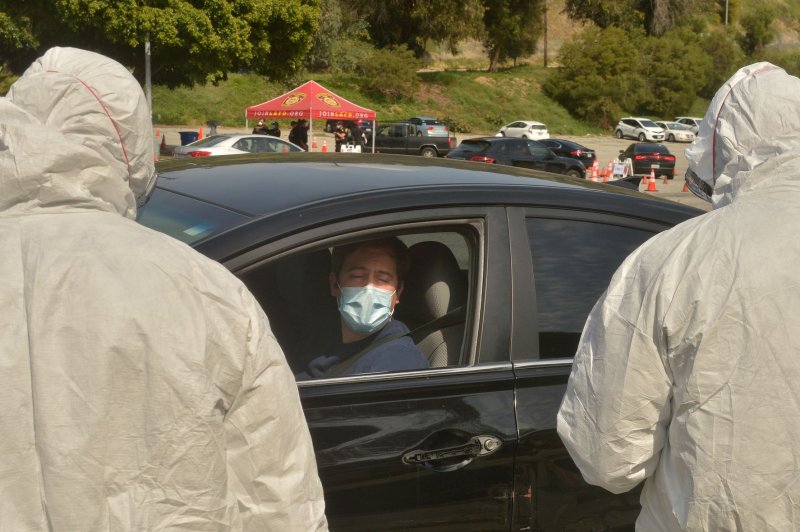Medical and fire department personnel distribute self-testing coronavirus kits to residents who made appointments in a parking lot adjacent to Dodger Stadium in Los Angeles on Saturday. Photo by Jim Ruymen/UPI |
License Photo
March 30 (UPI) -- A fast, simple test for COVID-19 scheduled to be released Thursday could speed diagnosis and help focus healthcare workers on areas with the worst outbreaks, experts said Monday.
The first of these so-called point-of-care tests, developed by Abbott Laboratories, is designed to yield positive results in as little as five minutes, though a thorough analysis to definitively rule out infection with the new coronavirus can take up to 15 minutes.
The company plans to begin distributing up to 50,000 test kits daily and, like another point-of-care test by Henry Schein Inc., they will focus primarily on hospital emergency rooms, urgent-care clinics and doctors' offices.
The United States has struggled to supply enough COVID-19 tests, even as the outbreak threatens to overwhelm hospitals in New York, California and Washington, among other states. And without a quick test, or enough of them, officials have not been able to determine where the problem was greatest.
After initially restricting testing to high-risk people, and those with obvious symptoms, and problems with a test designed by the Centers for Disease Control and Prevention, U.S. regulators have streamlined the approval process for new tests.
The newly approved tests will improve things "in substantial fashion going forward," Howard Koh, a professor of public health leadership at Harvard and former secretary for the Department of Health and Human Services under President Barack Obama, said during a conference call with reporters Monday. "Testing had been a challenge initially, but it's now ramping up."
The Abbott test is one of several developed since the COVID-19 pandemic exploded across the United States. In addition to its point-of-care test -- so called because it reveals results on-site, without samples being sent to a lab -- Abbott has also released the m2000 RealTime system, which last week received U.S. Food and Drug Administration approval for use in hospitals and molecular laboratories.
That system is designed to test up to 1 million samples weekly, but it takes longer to yield results. With the two platforms, Abbott plans to provide at least 5 million tests per month.
In addition, diagnostics company Henry Schein Inc. announced last week that its point-of-care antibody test, which looks for evidence that the immune system has fought off COVID-19 infection, would be available starting this week. According to the company, the antibody rapid blood test, known as Standard Q COVID-19 IgM/IgG Rapid Test and manufactured by SD Biosensor, Inc., is designed to deliver results within 15 minutes from a pinprick with no instrumentation required, although it can not be used to confirm active infection.
Healthcare professionals can use the results of the test, along with a patient's medical history, symptoms, and results of other relevant testing, to make decisions on quarantining and care. The test could conceivably also be used to identify potential blood donors for convalescent plasma treatments for COVID-19 currently being evaluated in New York and elsewhere.
Schein expects to have "at least several hundred thousand tests" available for use by physician offices, hospitals and other relevant health care institutions today and significantly increased availability beginning next month. The Standard Q COVID-19 IgM/IgG Rapid Test is being made available under emergency guidance issued by the FDA.
"This pandemic is an unprecedented situation, and making rapid diagnostic tools available to health care professionals is critical for detecting and mitigating the spread of the coronavirus," Stanley M. Bergman, Chairman of the Board and Chief Executive Officer of Henry Schein, said in a press release.
The company is the private-sector lead of the Pandemic Supply Chain Network, a public-private partnership created in 2015 to improve the efficiency of the supply chain for personal protective equipment.
According to Harvard's Koh, these point-of-care tests will take some of the pressure off American hospitals, many of which already are swamped with possible cases of the new coronavirus, because they enable testing at doctors' offices and walk-in clinics.
Currently, Koh said, the United States is testing about one-fourth as many people as South Korea, which implemented an aggressive testing approach and thus far has been able to avoid implementing stringent social distancing measures.
The country's testing capacity needs to "accelerate dramatically," he added. "These point of care tests will help, but we still have a ways to go."
The speed of newer tests also is key as healthcare workers in some parts of the country have had to wait days or more than a week for results, forcing them to remain in quarantine and further draining hospital capacity. These new point-of-care tests will "improve turnaround time," Koh said.
"It's frustrating for many people to wait days for results," he added. "That's not an efficient system."
Koh said that the country can't consider relaxing social distancing measures, which currently have about 200 million Americans on lockdown, until "we know the number of people infected."















